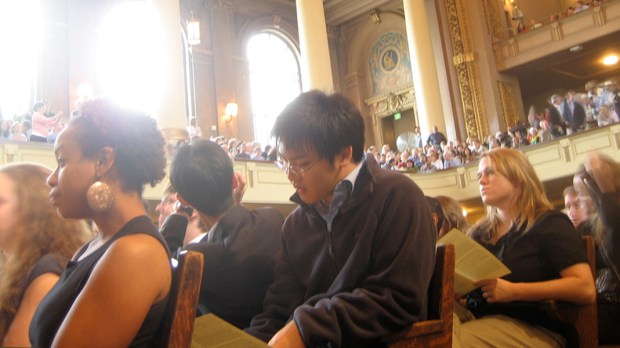It’s hard to ignore the irony. Today’s college-age students are said to be less religious than young men and women of previous generations. They make up a large portion of the “Nones,” those who might check “None” on a survey asking what religion they adhere to.
And Ivy League institutions are not known to be bastions of traditional Judaeo-Christian belief.
But a course being offered at Yale is so popular that university officials had to requisition the use of a historic campus chapel to accommodate the hordes of seekers signing up.
The course’s subject matter—human happiness—also seems to appeal to a yearning that is basic to humanity and which, some say, is ideally fulfilled in the spiritual quest.
Psyc 157, Psychology and the Good Life, had about 1,200 students signed up within a week after enrollment period opened. That’s almost one-quarter of Yale undergraduates. It has earned the distinction of being the most popular course in Yale’s 316-year history.
The course tries to teach students how to lead a happier, more satisfying life.
“Students want to change, to be happier themselves, and to change the culture here on campus,” psychology professor Laurie Santos, 42, told the New York Times. “With one in four students at Yale taking it, if we see good habits, things like students showing more gratitude, procrastinating less, increasing social connections, we’re actually seeding change in the school’s culture.”
Yale, and other universities full of high-achievers, may be a place that really needs such a course. In 2013, the Yale College Council found that more than half of undergraduates sought mental health care from the university during their time there.
“In reality, a lot of us are anxious, stressed, unhappy, numb,” Alannah Maynez, 19, a freshman taking the course, told the Times.
So, with so many students signing up, Yale had to find a lecture hall large enough. At first, the class was divided between a live lecture in the 844-seat Battell Chapel, a historic place of worship on campus, and one or two smaller auditoriums where several hundred more students watched a live stream. After several weeks, though, lectures were moved to Woolsey Hall, home of the Yale Philharmonia.
According to the Times, the course “focuses both on positive psychology—the characteristics that allow humans to flourish, according to Dr. Santos—and behavioral change, or how to live by those lessons in real life.” It includes weekly “rewirement” assignments, like performing acts of kindness and forming new social connections.

